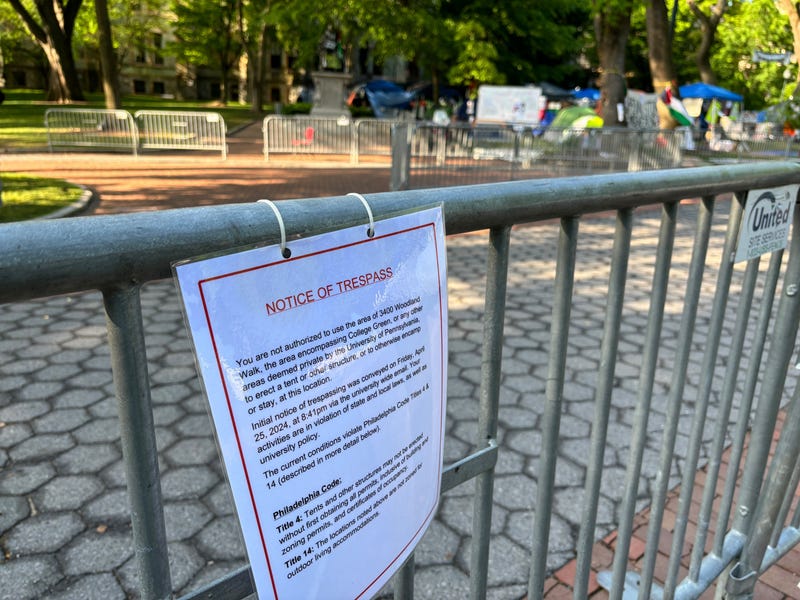
PHILADELPHIA (KYW Newsradio) — The interim president of the University of Pennsylvania is once again calling on the pro-Palestinian encampment protest on campus to end. The stalemate, however, is inching closer to the two-week mark as protesters refuse to leave until their demands are met.
Interim President Larry Jameson released another statement on Monday that reiterated the university’s position: “The encampment should end. It is in violation of our policies. It is disrupting campus operations and events, and it is causing fear for many in our large, diverse community, especially among our Jewish students.
“Every day the encampment exists, the campus is less safe. Some have aimed to characterize this as a peaceful protest. It is not.”
Jameson cited the vandalism of Penn landmarks — the Ben Franklin statue and the Button sculpture — near the encampment site. He said there have been reports of harassment and threatening speech against Penn students, as well as instances of harassment against protesters in the encampment.
He said the university is focused on de-escalating the situation.
The protesters, who held a large rally in front of the Ben Franklin statue on College Green Monday night, have dug in since they started the encampment on April 25.
The Penn chapter of Faculty for Justice in Palestine (FJP) released a statement countering Jameson’s claims: “In spite of your language around de-escalation, we find this message to the broader Penn community to be an unnecessary escalation of already fraught tensions on campus. Students and their faculty supporters have worked diligently to reach a state of negotiating in good faith with you and Provost Jackson, but you seem to indicate that there is no path forward following this email communication. While these tensions on campus are felt by everyone, students and faculty remain focused on the tragedy and horrors unfolding daily in Palestine, Rafah, and Gaza.”
Penn FJP also said the Jewish community is not a monolith, and Jameson ignored the fact that there are Jewish students and community groups who are protesting with and supporting the encampment.
The protesters are continuing to demand the university disclose its investments in companies that are profiting from the actions of the Israeli government in its war against Hamas, divest from those businesses, and defend the rights of students to express support for Palestinians without retaliation from the university.
Protesters told reporters Tuesday afternoon that they met with university leadership again but did not reach an agreement. They said they will not leave until their demands are met.
“We are here to stay,” said a Penn graduate student, who preferred not to be identified. “Doesn’t matter to us when graduation is, when alumni week is. There are more important things than graduating and having fun at a party.
“We are going to continue this process with them and hope that they are willing to negotiate with us moving forward.”
Jameson and other university officials have been pressured to put their foot down and end the encampment. A group of Jewish Penn students, faculty and alumni delivered a petition with more than 3,000 signatures to Jameson’s office last week, calling for action.
Jason Holtzman, director of the Jewish Community Relations Council, emphasized that students have reported being harassed by people in the encampment.
“I understand students’ right and students’ desire to protest, but when it’s antagonizing campus — when we hear from several students over and over again that they’ve received antisemitic comments from people in the encampment, that they’ve been intimidated, that they’ve been harassed — I think the university needs to take action to remove the encampment to show the Jewish students that they care about them too,” he said.
“When the university is saying that this encampment is in violation of their own university’s policies, we would hope the policies would be enforced,” he continued, “and that there would be a way to break this encampment down and allow the students to protest in different ways that don’t antagonize the campus and antagonize the students and faculty.”
Jameson, in his statement, said it is a complicated matter that needs to be handled very carefully.
“Any response to the encampment must balance possible escalation of the current situation with the need to protect the safety and rights of everyone,” he wrote. “At Penn, this risk is more significant than at some other institutions because we have an open campus in a large city.”
“Student conduct procedures” have been implemented, Jameson added, which may prevent some student protesters from graduating or continuing their education at Penn in the coming years.
